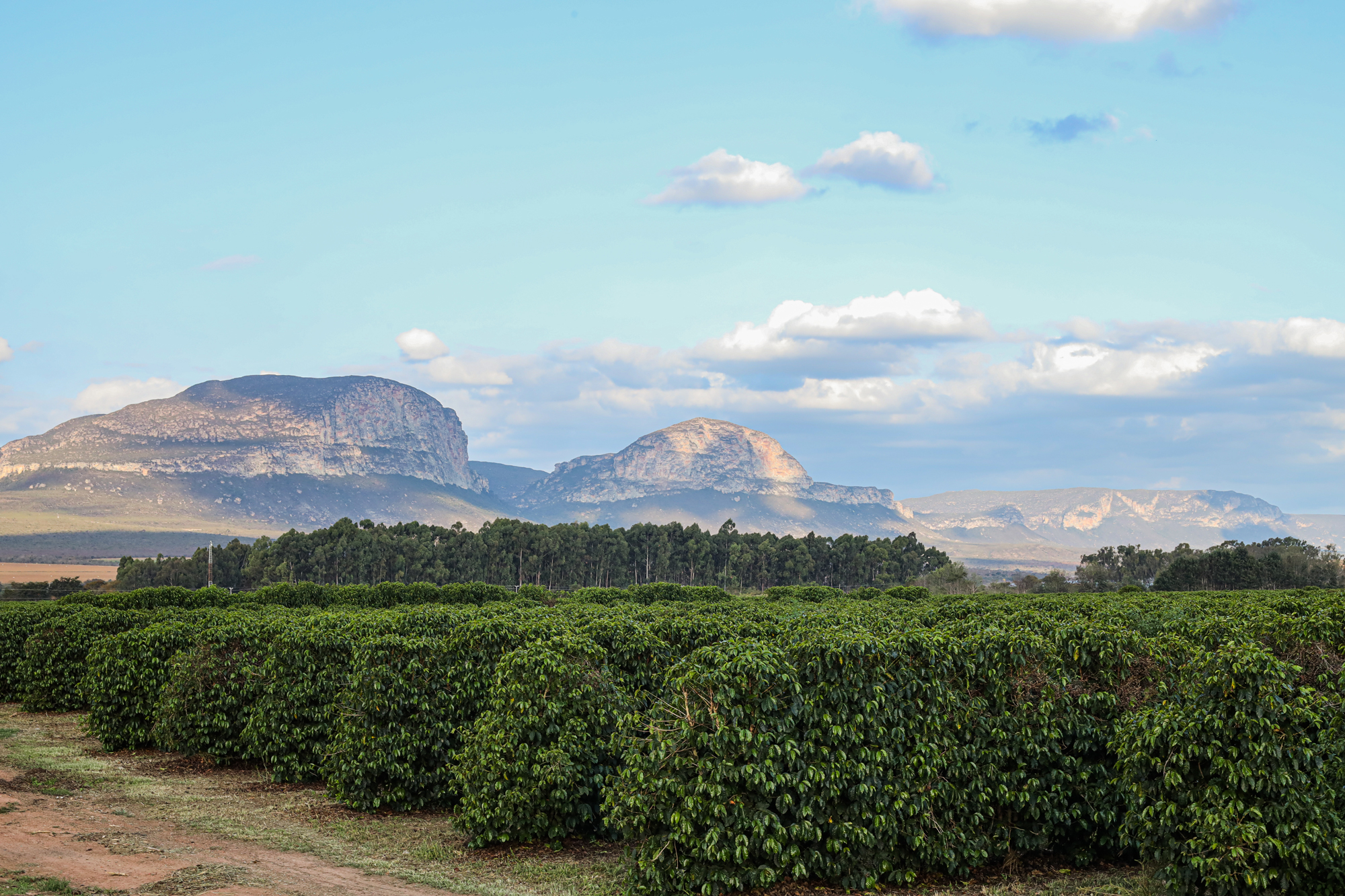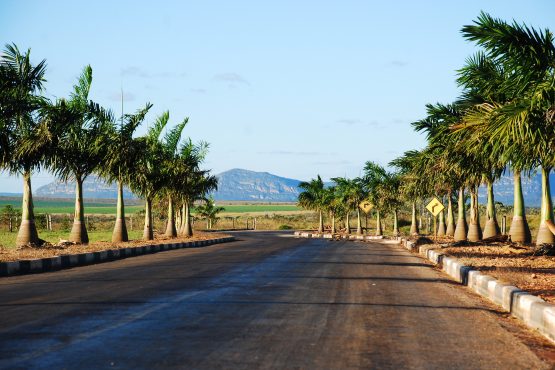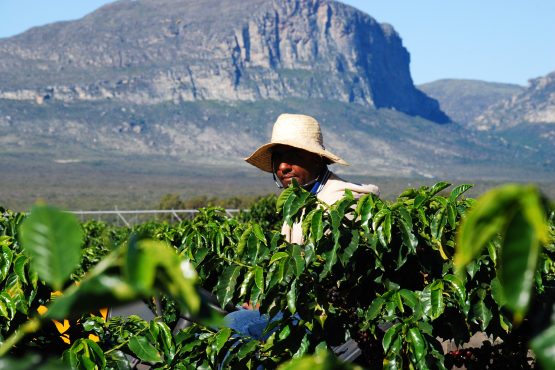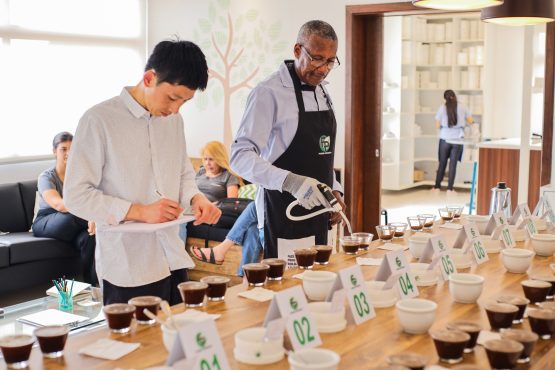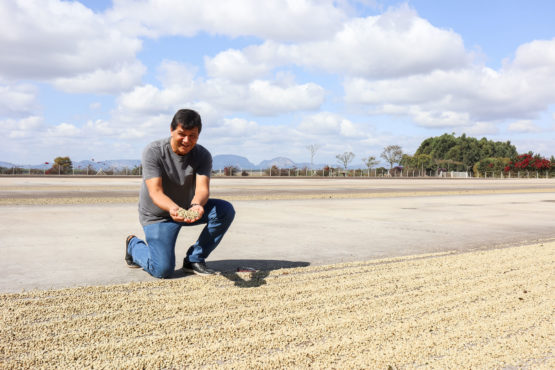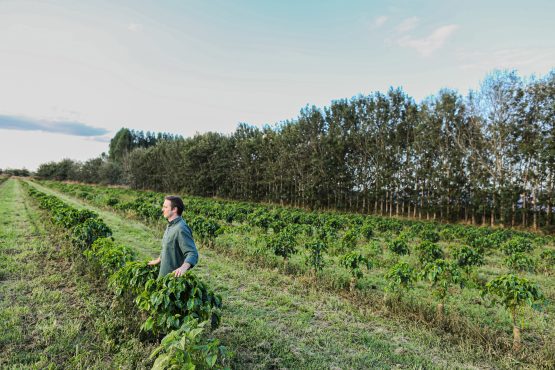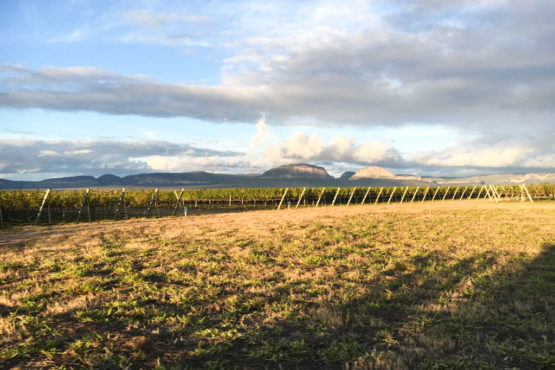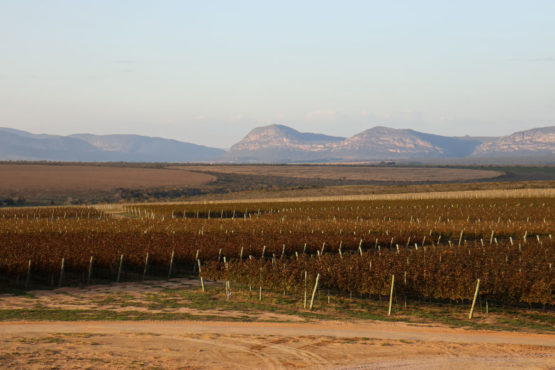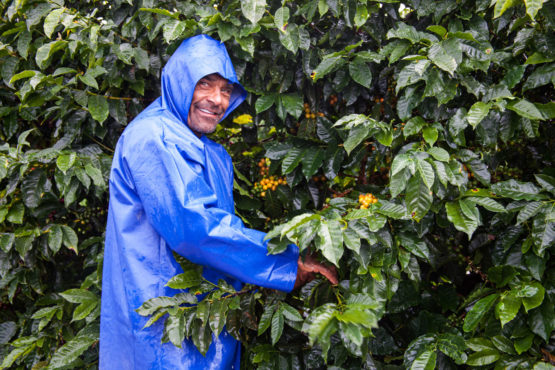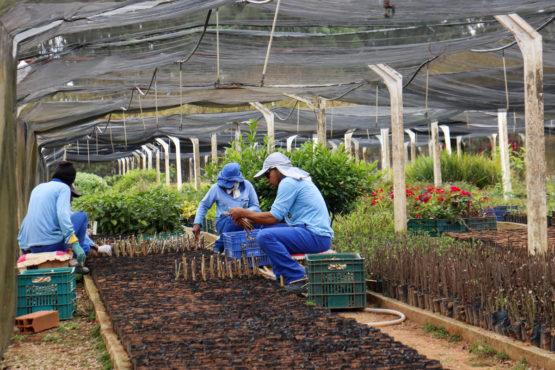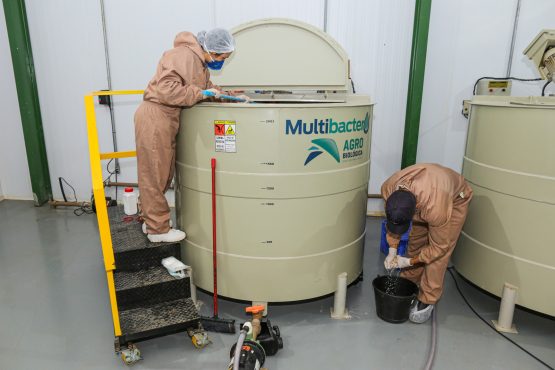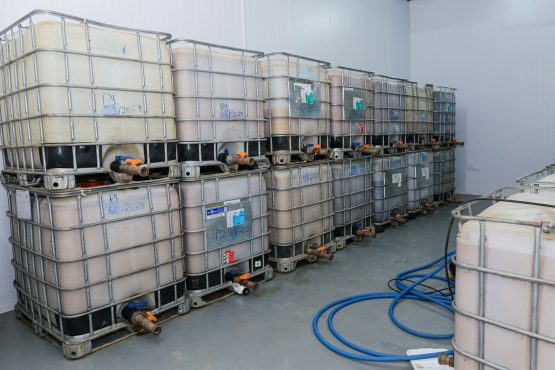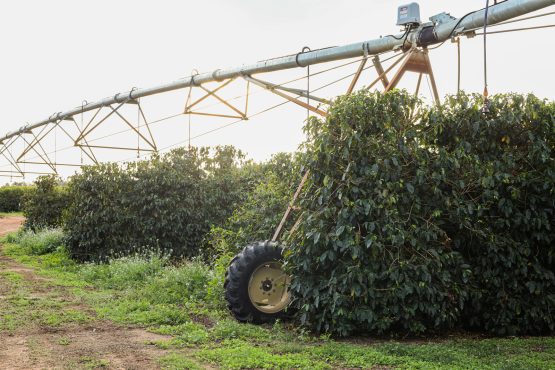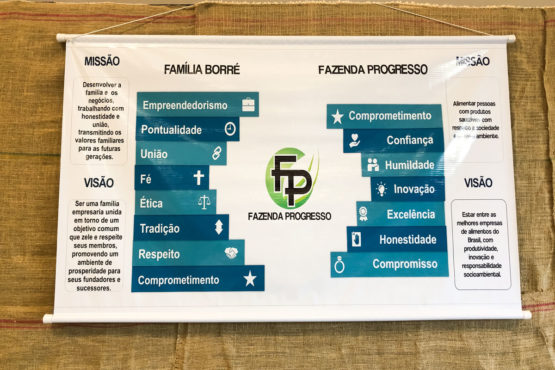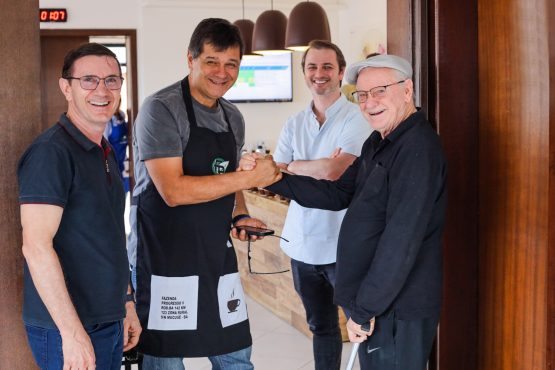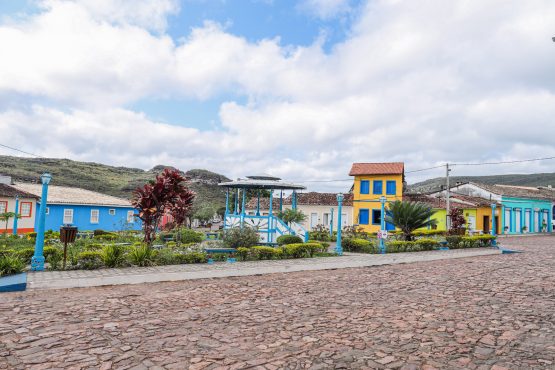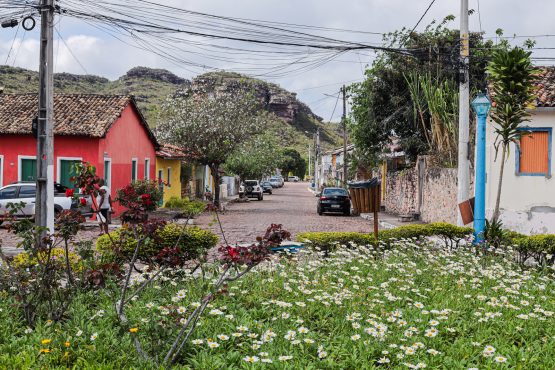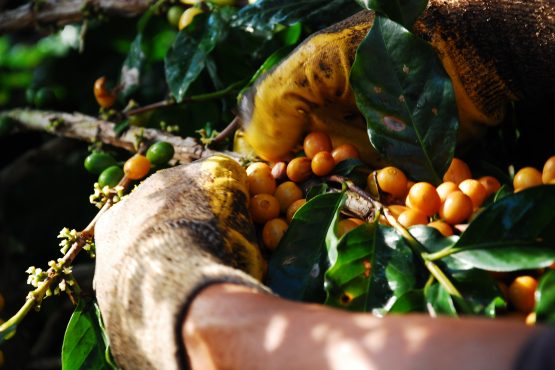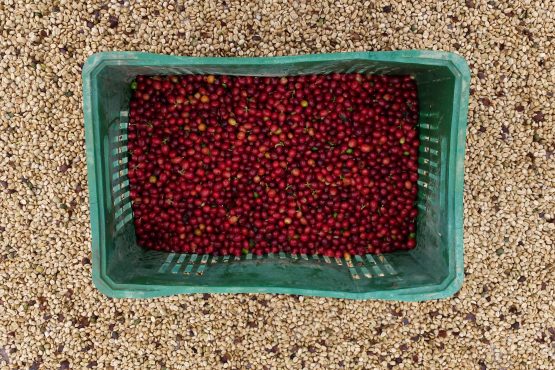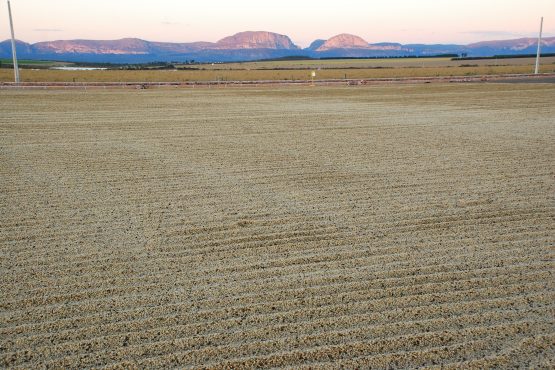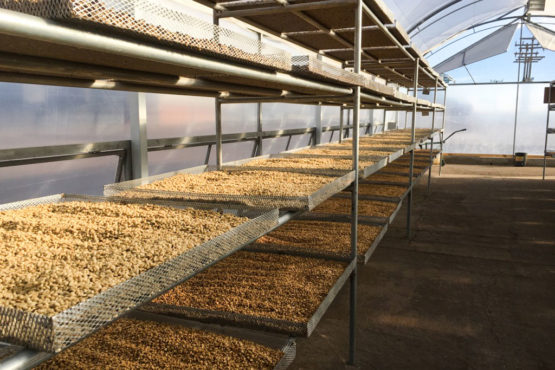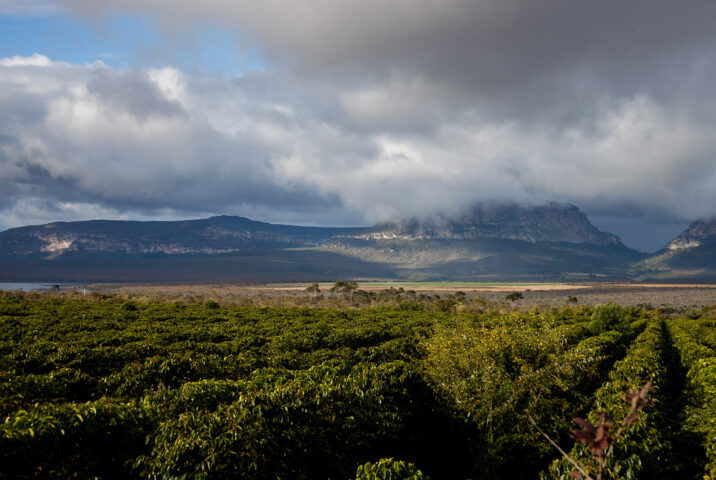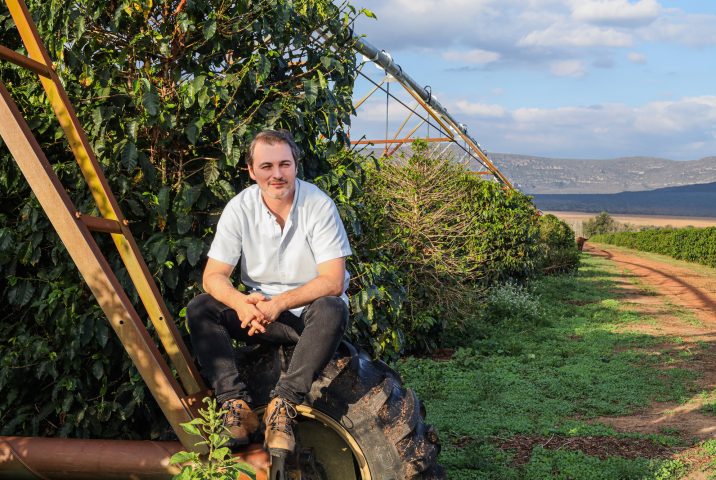Sincorá
Sweet and silky, with tropical acidity balanced by dark chocolate. Golden raspberry and dates.
Sincorá is a microlot selected from Fazenda Progresso, a stunning farm in the Brazilian state of Bahia that is owned by the Borré family. It is named after the Serra do Sincorá, a breathtaking chain of mountains surrounding the property which are part of the Chapada Diamantina National Park.
ABOUT FAZENDA PROGRESSO
Fazenda Progresso is a beautiful estate nestled in the Chapada Diamantina mountain range, in the heart of Bahia. The farm is located near the town of Mucugê, and sits on a plateau at 1,150m above sea level surrounded by the Chapada Diamantina National Park, known for its mountainous cliff formations (Chapada) and 19th-century diamond mining (Diamantina). The region’s high elevation plays a key role in the quality of the coffees produced here, as does its temperate climate. Hot days and cool nights — with an average temperature variation of just 10°C — create ideal conditions for slow coffee cherry maturation and a gradual development of natural sugars in the fruit, resulting in a sweet and complex cup.
Owned by the Borré family (who have been in business for three generations), the history of Progresso dates to 1984 when the Borré family migrated from Southern Brazil to the northeast and purchased land in the municipality of Ibicoara, near the town of Mucugê. In the farm’s early years, the family tried growing crops such as soybeans, wheat and English potatoes. The potatoes turned out to be an extremely successful crop, stimulating investments and leading the family to become one of the largest producers of potatoes in Bahia.
In 2005, the Borré family sought to diversify the activities on their land and quickly recognised that the high elevations, plentiful rainfall, and rich soil found on their property were ideal to produce specialty coffee. The family’s youngest son, Fabiano Borré, spearheaded the coffee program, investing in state-of-the-art infrastructure and agricultural practices to ensure they could produce the very highest quality coffee possible. Fabiano has surrounded himself with an exceptional team and sought advice from some of the most respected professionals in the field, including Silvio Leite, founder of the Cup of Excellence and president of the Brazil Specialty Association, who has over 30 years of experience in coffee grading, tasting and quality control.
Today, some 530 hectares of the property are dedicated to coffee. This land is divided into five different plots: Progresso 1, Progresso 2, Floresta, Três Irmãos and São José, where only two varieties are grown: Catuaí 144 (Red Catuaí) and Topazio (a hybrid of Mundo Novo and Red Catuaí bred in Brazil in the 1960s). Lots are typically processed separately, depending on yields, using Fazenda Progresso’s meticulously designed infrastructure. Over the last decade, Fabiano has continued to experiment and invest in equipment and processes that will improve the quality of his coffee. He has implemented a robust quality control program, including a dedicated quality control lab with a talented cupping team headed up by Ednaldo Nascimento, who has worked with Progresso since 2010. This focus on quality was rewarded the first time Progresso entered coffee into the Cup of Excellence competition in 2015 and placed 15th – a fantastic achievement and testament to the hard work, resources, and focus that has been put into producing exceptional coffee. They also went on to place 20th in the 2017 Cup of Excellence.
The Borré’s motto is ‘Mindful Coffee’. This describes their commitment to acting mindfully and ensuring that their family values and vision (centring around excellence, innovation, and environmental and social responsibility) inform every decision they make and define how they do business. Fazenda Progresso’s people and their welfare are enormously important to the Borré family, and they take great care to create an excellent work environment for their staff. Buses are provided to and from work, and clean and welcoming lunch facilities and bathrooms have also been built on site. The staff also receive insurance, protective wear, sunscreen and biannual health check-ups by a resident doctor.
The family offers financial support to a local school in Roncador, the small village next to the farm, where they’ve also built a medical centre (in collaboration with Danish coffee machine makers Scanomat), and a veggie garden that is used by the school. The Borrés have also invested heavily in local tourism in and around Mucugê, with the goal of invigorating the region and providing more economic and employment opportunities to the local community. Their business ventures include planting vineyards, opening a state-of-the-art winery and operating a boutique hotel to attract domestic and foreign tourists.
More recently, the family has campaigned tirelessly to earn the broader region of Chapada Diamantina Geographical Indication for specialty coffee by Denomination of Origin — which they achieved in 2024. Geographical Indication recognises the human and environmental factors that result in the exceptional cup profile produced within a specific region, and this accomplishment is extremely meaningful to the local producing communities. Since 2021, Progresso have also sponsored a coffee competition that rewards smallholder producers in the towns surrounding the Chapada mountain range. By supporting the local coffee community, the Borrés hope to elevate the name of Chapada Diamantina and to encourage farmers to pursue quality-focused production, with the long-term goal of the region’s coffees fetching higher, more sustained and profitable prices.
Caring for the environment is a core value for the Borré family, who take great care to protect and preserve the ecological health of their area. Water for processing is sourced from the nearby Paraguaçu river and a nearby dam and is carefully dispensed across the estate. Meteorological stations are positioned throughout the farm to monitor the nutritional needs of each plot, ensuring only the exact requirements for water and other inputs are dispensed to the coffee trees. The inputs are distributed through a combination of drip and pivot irrigation systems — thereby optimising irrigation and minimising waste. Fabiano is planning on converting the entire system to pivot irrigation, as this style helps promote the growth of grass coverage around the coffee trees, which also help in retaining moisture.
Coffee pulp from processing is composted (along with potato wastage, which is very high in potassium and great for coffee trees) and used to fertilise trees throughout the plantation. In recent years, the Borrés have begun harvesting beneficial bacteria and microorganisms from the farm and cultivating them in bioreactors, to be used as naturally derived fertilisers and pesticides in place of chemical inputs. As further proof of their commitment to environmental sustainability, 75% of the property is preserved as native land, well above the national minimum of 20%.
The Borré family business has always been managed and directed by family members and is now in its third generation of operation. You can read an interview with Fabiano Borré here.
ABOUT MUCUGÊ
Located in Brazil’s state of Bahia, the town of Mucugê is considered the gateway to Chapada Diamantina’s historical mining region. It is the traditional home of the Maracás indigenous people, who bravely defended their land during the Portuguese invasion of Brazil in the seventeenth century. While they were eventually defeated by the foreign invaders, the nearby municipality of Maracás is named in their honour and located on their historical capital city. The word “mucugê” comes from the indigenous Tupi language (which was spoken by most First Nations People along Brazil’s coast), and it refers to the mucujé, or couma rigida plant, an edible sap tree found throughout the region.
Due to the fierce battles that occurred and the mountain ranges that surround Mucugê, colonisation was slow to occur, however, in the mid-1800s gold and diamonds were found in the local rivers and waterways and the town quickly became the capital of the nation’s mining industry. Over the next century, the town rose in prominence as diamond mining boomed in Brazil — but its importance declined sharply as the industry faced competition from other countries and synthetic diamond production. In the 1960s and 70s, mining practically disappeared and Mucugê’s population dropped as low as 400 inhabitants. The land surrounding the town was left depleted and its population exhausted, as diamond mining is incredibly invasive and arduous.
Mucugê has seen a resurgence in the last 40 years, as the local government has put conservation efforts at the helm and agriculture has become the main industry of the region. With the establishment of the Chapada Diamantina National Park and a greater emphasis on preserving the region’s biodiversity and history, Mucugê has become a favourite tourist destination for Brazilians. Companies like Fazenda Progresso, who have adopted the use of technology and strict environmental policies, are a great example of what the future holds for the region.
In 2024, coffees produced in the Chapada Diamantina surrounding region were awarded Geographical Indication by Denomination of Origin, a designation that recognises the human and environmental factors that result in the exceptional cup profile produced within a specific region. This accomplishment is extremely meaningful to the local producing communities that surround Mucugê.
HOW THIS COFFEE WAS PROCESSED
This particular lot comes from the Fazenda Floresta plot of Progresso Estate.
Cherries for this lot were carefully hand-picked at the peak of their ripeness in August, by a specially trained team. Since 2023, Progresso have implemented cherry colour sorting, by installing a machine that uses infrared light to separate any green (unripe) fruit from the ripe red cherries that are ideal for processing. These cherries were then carefully processed as a pulped natural lot: the cherries’ skin and fruit were removed (using one of Progresso’s four depulpers) and the sticky, parchment-covered beans were soaked in a tank with water for 12 hours.
The coffee was then dried on raised beds in a greenhouse environment for a between 14 to 15 days. When the parchment reached 14-15% moisture content, it received a final touch of drying in mechanical dryers at 33oC to ensure the remaining moisture was homogenised. Progresso has done a lot of experimentation with drying and has found that this method yields the very best results and ensures that the coffee holds its quality over an extended period of time.
When the desired moisture content was reached, the coffee was cupped by the QC team and placed in large silos to rest. Once approved and ready for export, it was processed at Fazenda Progresso’s dry mill which is also located on the farm.
WHAT IS IN A NAME?
When Progresso was first founded, it was given its name ‘Progresso’ which translates quite literally to ‘Progress’ in English. This name reflects the family’s concept and philosophy of business – which has been held and passed down across generations and is still very relevant to the family’s ethos, business culture and drive today. It portrays their boundless energy, their entrepreneurial spirit and drive, and their unwavering commitment to quality and improvement in every working day. We feel very lucky to be working with Fabiano and the Fazenda Progresso team and look forward to sharing their coffees with you for many years to come!
